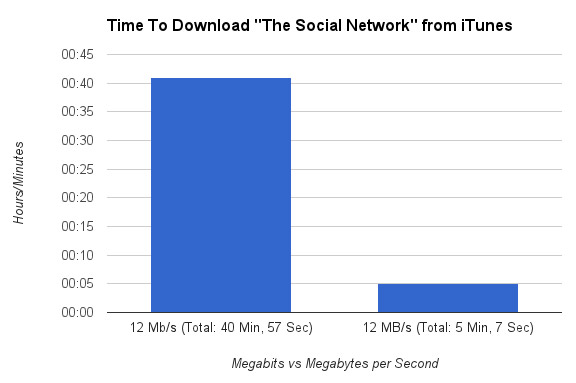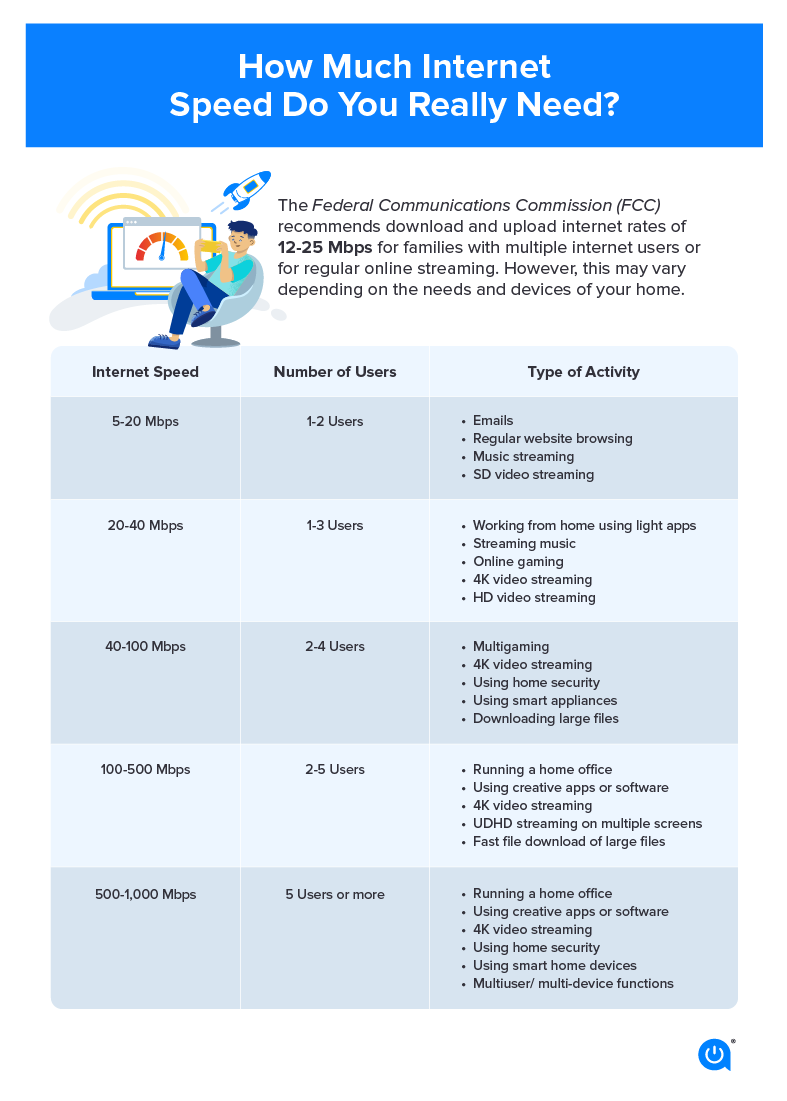The Future of Internet Speeds: Trends in Megabits Per Second
The Future of Internet Speeds: Trends in Megabits Per Second
Blog Article
How Megabits Per Second Influence Your Online Activities
The concept of megabits per second (Mbps) plays a pivotal role in forming our on-line experiences. As digital activities proliferate, comprehending the implications of Mbps on pc gaming, video clip, and streaming conferencing ends up being increasingly important. Higher Mbps can enhance performance and lower disturbances, while poor speeds may foster stress and ineffectiveness. Evaluating your home's specific needs in connection with these rates is essential, particularly as numerous gadgets vie for data transfer. Yet, the nuances of just how Mbps influences numerous online tasks require more expedition, especially as our dependence on electronic connection remains to develop.
Understanding Megabits Per Second
When considering web rate, it's necessary to recognize the principle of megabits per second (Mbps), which functions as a basic dimension for information transfer rates. This statistics evaluates just how much data can be sent over an internet connection in one second, giving a clear understanding of performance capabilities - Megabits Per Second. For context, one megabit amounts to one million little bits, and Mbps is typically utilized to share bandwidth for different on-line activities
A greater Mbps shows a faster internet connection, allowing customers to perform jobs such as downloading files, browsing web sites, and participating in online gaming much more efficiently. Normal surfing requires around 1-5 Mbps, while streaming high-def video might require 5-25 Mbps. Recognizing these requirements is important for establishing the appropriate internet speed needed for certain tasks.
In addition, the variety of tools linked to a network can affect general performance. Multiple users streaming, gaming, or downloading and install simultaneously can stress readily available data transfer, leading to slower speeds - Megabits Per Second. Assessing personal online practices and requirements is vital in picking an internet plan that aligns with one's demands, making certain a smooth digital experience
Streaming and Buffering Issues
Streaming high-definition web content has become a staple of modern-day on-line enjoyment, yet it is commonly gone along with by frustrating buffering issues. These disturbances can dramatically interfere with the seeing experience, leading to frustration and prospective loss of target market interaction. Buffering occurs when the information transmitted from the streaming solution is not gotten quickly sufficient to preserve a smooth playback, commonly as a result of insufficient internet rate gauged in megabits per second (Mbps)

In addition, real-time streaming can be affected by network congestion, which happens when multiple tools share the very same transmission capacity. Enhancing link rate and making certain sufficient Mbps is important for a seamless streaming experience. As streaming services continue to evolve, comprehending the influence of Mbps on buffering concerns remains essential for consumers looking for nonstop entertainment.
Online Video Gaming Performance
The influence of net rate on on-line activities extends past streaming, significantly affecting on the internet pc gaming efficiency. In competitive pc gaming, reduced latency and high data transfer are essential for a seamless experience. A rapid link reduces lag, permitting players to respond quickly to in-game occasions, which can be the distinction between triumph and defeat.
Bandwidth, gauged in megabits per second (Mbps), plays a crucial duty in sustaining multiple tools and pc gaming systems concurrently. Not enough transmission capacity can result in dropped links or decreased video game high quality, adversely influencing gameplay. For example, on-line multiplayer games need substantial information transfer, especially throughout peak pc gaming hours when countless gamers are online.
Furthermore, the kind of game can likewise determine the required net rate. Hectic first-person shooters require greater speeds to preserve responsiveness, while turn-based technique video games might function reasonably well on lower speeds. As on-line gaming continues to evolve, with raising graphical fidelity and more intricate multiplayer settings, the demand for higher Mbps will only magnify. Players need to guarantee they have ample net speed to boost their pc gaming efficiency and total experience. Buying a durable web link is vital for gamers aiming to optimize their performance and satisfaction.
Video Conferencing Quality
In today's electronic landscape, video conferencing top quality is greatly influenced by internet speed, specifically in terms of bandwidth and latency. High-quality video clip calls need adequate transmission capacity to transfer sound and video data perfectly. Commonly, a minimum of 1.5 Mbps upload and download rates is advised for basic interpretation video clip, while high-definition video conferencing typically demands at least 3 Mbps.
Latency, click here for more or the hold-up in between sending and receiving information, likewise plays a critical function in the user experience. Low latency makes sure that conversations flow naturally without uncomfortable pauses or disturbances. Preferably, latency ought to be listed below 150 milliseconds for reliable interaction. Greater latency can lead to echo, lag, and disjointed communications, which can impede collaboration and engagement throughout meetings.
Moreover, numerous participants in a video seminar can stress available transmission capacity, demanding even higher rates. Network blockage, often caused by synchronised tasks like streaming or downloading, can further break resource down video high quality. Therefore, for companies depending on video clip conferencing for remote cooperation, recognizing the partnership between megabits per second and total interaction quality is necessary for preserving productivity and enhancing online interactions.
Choosing the Right Web Plan
Choosing a suitable web plan is critical for making certain optimum performance in different online activities, specifically in settings that require high transmission capacity, such as video conferencing and online pc gaming. Megabits Per Second. When considering a net plan, it is necessary to assess both the speed and information allocation to match your particular use requirements
For homes with multiple customers taking part in synchronised activities, a plan using higher megabits per second (Mbps) is advised. Typically, a minimum of 25 Mbps appropriates for basic streaming and surfing, while plans exceeding 100 Mbps are more suitable for even more extensive tasks. Additionally, take into consideration the nature of your online tasks; video clip conferencing requires a minimum of 1.5 Mbps post rate, while on the internet gaming may require a reduced latency yet regular link.
It is likewise important to assess your data cap. Unlimited data strategies can stop throttling and interruptions, specifically if hefty use is prepared for. Research service companies in your location, as availability and prices can vary. By attentively selecting an internet plan tailored to your demands, you can boost your online experience, guaranteeing smooth, continuous access to your recommended activities.
Conclusion
To conclude, the importance of megabits per second (Mbps) in forming on-line activities can not be overstated. Higher Mbps helps with seamless streaming, minimizes buffering, improves video gaming experiences, and makes sure high-quality video clip conferencing. Alternatively, poor transmission capacity can cause irritating disruptions and reduced efficiency throughout different tasks. For that reason, an extensive understanding of private or home Mbps requirements is essential for picking an ideal net plan that properly supports varied online tasks and user needs.

Generally, a minimum of 25 Mbps is suitable for conventional streaming and browsing, while plans going beyond 100 Mbps are better for even more intensive jobs. In addition, think about the nature of your online activities; video clip conferencing needs have a peek at these guys at least 1.5 Mbps post rate, while online gaming might need a reduced latency but regular link.
Report this page